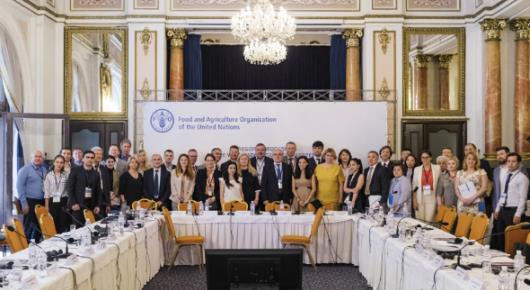Regional workshop on WTO Trade Facilitation Agreement impact on agrifood trade

The FAO Regional Office for Europe and Central Asia organized a Regional Workshop on the WTO Trade Facilitation Agreement (hereinafter “TFA”) impact on agrifood trade in the framework of FAO’s regional initiative Improving Agrifood Trade and Market Integration. The Workshop was held in Odessa, Ukraine, on May 30 – 31, 2017.
Participants representing nine European, Central Asian and Caucasus states received a detailed overview on the fundamental provisions of the WTO Trade Facilitation Agreement, and the obligations of WTO member states in the field of trade facilitation.
The Workshop offered the representatives of Ministries, committees, business and expert communities a platform to discuss challenges in the development and implementation of trade facilitation policies for their countries, and to develop ways of strengthening national capacities in this area.
After summarizing the results of the workshop, participants attended the opening ceremony of the Agro-Logistics Exhibition and visited the Odessa Sea Commercial Port where they studied the operation of the grain terminals.
FAO commodity and trade economist Iryna Kobuta welcomed participants to the Agro-Logistics Exhibition on behalf of FAO.
Close to 50 specialists from Armenia, Azerbaijan, Belarus, Georgia, Kazakhstan, Kyrgyzstan, Moldova, Tajikistan and Ukraine together with EU experts participated in the workshop.
“Proper implementation of the provisions of the WTO Trade Facilitation Agreement will help agricultural producers and exporters diversify their markets, offer new products, facilitate the participation of small and medium-sized enterprises in global value chains, and attract more investments,” Iryna Kobuta said.
In his presentation, Mario Apostolov, Regional Adviser, Trade Division, United Nations Economic Commission for Europe (UNECE) pointed out that international trade and especially agrifood trade implies complex operations with certain regulatory requirements involving a number of players, each having its own requirements and interests. This in turn creates opportunity for certain players to benefit from those complexities. It inspires resistance to the trade facilitation process by those who have built their businesses on the complexity of the international trade.
The WTO Trade Facilitation Agreement is aimed at minimizing formalities and documentation requirements by keeping only those aspects that are really needed to regulate the trade. It provides a periodic revision of existing formalities and requirements, with a view to reducing and simplifying them. The objectives are to accelerate the process of handling and release of goods (especially perishable products), and promptly cancel requirements when there is no public need for them. At the same time, the interests of society must be protected, Apostolov said.
Kenza Le Mentec, representing the World Trade Organization, said that in addition to the Trade Facilitation Agreement WTO offers other agreements directly related to trade procedures and their simplification. These include the Agreement on the Application of Sanitary and Phytosanitary Measures and the Agreement on Technical Barriers to Trade. Concerns on the part of phytosanitary and veterinary services that the Trade Facilitation Agreement might pose a threat to food safety and security were unreasonable, she said, and the Agreement was rather an opportunity to strengthen this type of security, constituting no threat to it.
During the presentations by country representatives, it was clear that each country is at a different state of implementation with the Trade Facilitation Agreement. In some countries (Azerbaijan, Kyrgyzstan, Moldova), there is a fragmented introduction of elements of the Agreement – such as a Single Window or electronic certification. In other countries (Georgia), an electronic service for obtaining import permits has already been in effect for several years.
Some states (Kazakhstan, for example) plan to implement elements of the Trade Facilitate Agreement in the near future. Their interest in the Agreement is also reflected in the fact that work is being done at the legislative level. National bodies and working groups on trade facilitation are being established, and the countries are working jointly with international organizations to implement the Agreement.
The representative from Moldova emphasized possible positive aspects of implementing the WTO Trade Facilitation Agreement – in particular, increased transparency, decreased corruption factors, identification of possible development partners, facilitated access to the global production chain, trade diversification, and acceleration of customs clearance.
Nevertheless, most participants noted that lack of coordination among national agencies and with external trading partners, weak infrastructure, and lack of experts in trade facilitation were slowing down the implementation in the countries of the region.
At the end of the workshop, it was concluded that trade facilitation should be implemented through a set of measures at national and international level to ensure simplification and harmonization of customs procedures.
To overcome existing obstacles to trade facilitation, participants and experts pointed to a need for greater interaction among national agencies and with trading partners, in order to develop a harmonized data exchange system. Participants also expressed the need for regular international exchange of experience in this field.
Feedback from participants
Uasilia Baykadamova, Kazakhstan
“The workshop was rather constructive. It offered interesting presentations and speeches, in particular, those concerning the implementation of the ‘Single Window’ in the different countries.”
Pavel Cherevan, Republic of Moldova
“The workshop was well organized. I learned a lot about the WTO Trade Facilitation Agreement, filled the gaps in my knowledge and made important conclusions for improving the quality of work in the field of agriculture.”
Bubusara Toktonalieva, Kyrgyz Republic
“The workshop was quite interesting. It revealed several relevant topics as well as provided great opportunity to share experiences, networking with colleagues from other countries. The materials presented during the workshop will be very useful in the process of implementing the Trade Facilitation Agreement in our country, taking into account the importance of the agricultural sector in the economy of the Kyrgyz Republic. Also I would like to note the excellent organization of the event and express my gratitude to the organizers and FAO for the opportunity to take part in this Workshop.”
1 June 2017, Odessa, Ukraine
